As the clock strikes midnight on Nov. 1 every year, many writers around the world take a deep breath as they prepare to attempt an interesting challenge: write a novel in one month. November was established as National Novel Writing Month in 1999 according to NaNoWriMo.org. It brought with it the challenge of writing 50,000 words — equivalent to the average novel — in thirty days.
In 2006, NaNoWriMo was established as a nonprofit organization “that believes in the transformational power of creativity. We provide the structure, community, and encouragement to help people find their voices, achieve creative goals, and build new worlds—on and off the page.”
Since it’s founding, the organization has offered writers brave enough to attempt the challenge resources such as pep-talks from other authors, words of encouragement, and a place to interact with fellow authors working towards completing their writing goals year-round.
Dustin M. Hoffman, an associate English and writing professor at Winthrop University, was first properly introduced to NaNoWriMo upon his hiring at the university.
“When I came here, there was a little NaNoWriMo group going on. One of my colleagues, Professor Amanda Campbell, had been doing something with it before, and she asked me to get involved,” he said.
According to Hoffman, the main goal of NaNoWriMo is to push the writer to “set up a certain amount of words to write per day and [they] have these goals to achieve.” In the case of someone aiming to complete the challenge’s set 50,000 words, Hoffman estimated that they would have to write 1,600 words a day.
“That’s a lot of words to write every single day for the month of November,” Hoffman said. “But that’s the goal, right? You give yourself an absurd deadline and you come out at the end of the month with a completed draft of a novel.”
While Hoffman said he thinks NaNoWriMo is good for getting writers to actually write, he added that he had mixed feelings about the event.
“I think writing is rewriting and this is all drafting,” Hoffman said. “That’s the whole point of NaNoWriMo. I think the great thing of NaNoWriMo is that you could come out and have a draft of a novel. But I think there’s also a misconception of what you were going to end up with at the end.”
Hoffman worries that writers taking the challenge will expect to finish it with something more than just a, as author Anne La- mott put it, “s****y first draft.”
However, he does think if writers come to terms with that, then can “there’s real value in just getting the words out there.”
Hoffman also spoke about the issues with the timing of the event, especially for students, professors and any other faculty member in academia. He said,
“What’s the worst month of the year for us? It’s November. Everything’s due,” he said. “We have final exams. We have final projects. It’s really tough to find the time.”
Another thing that makes Hoffman skeptical about NaNoWriMo is that the goals set by the challenge may be largely sustainable.
“Maybe you can do [1,600 words a day] for a month and maybe you’ll never want to do it again after that, which I think is also problematic, too. It creates this impossible goal to continue on,” he said.
While Hoffman is sure some authors can manage it, he fears that others will feel discouraged when they can’t reach this goal. He believes that these writers should try to instead aim first for smaller word counts.
Hoffman said, “I found after doing NaNoWriMo, I would try and write for an hour a day or write a thousand words a day, like how unsustainable that is…I found I needed a smaller goal, so I gave myself this goal. I’d write one hundred words every day and I stuck with it for like two and a half years. I did it every single day.”
Hoffman still believes NaNoWriMo can be a great way for writers to develop a habit of writing, whether they work to write the full 50,000 words or set their own word count goal to work on that month.
“My advice to writers, even if you don’t do NaNoWriMo, consider a goal that could actually be achieved every single day,” Hoffman said. “I do think writing every day is so important and beneficial to a writer rather than just doing it in spurts.”
Photo by Olivia Esselman





this way People are bound to find this really important. I think the second paragraph pretty much says everything.